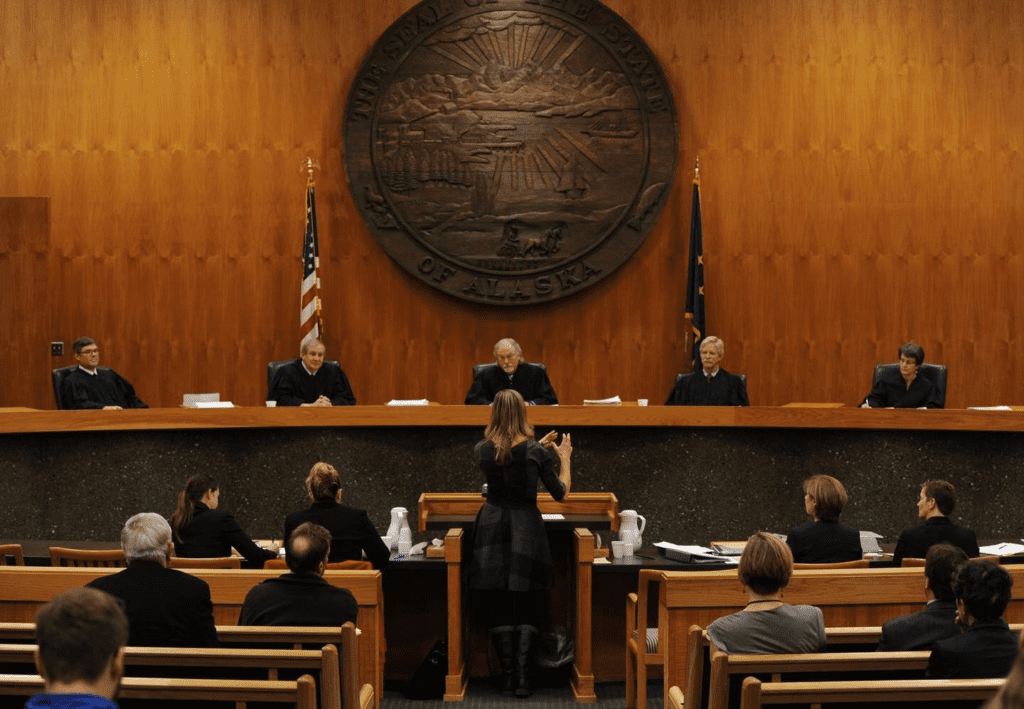The Alaska Judicial Council has proposed that voters retain all 19 judges listed on the November election ballot. However, the council was divided on this recommendation.
During their Wednesday meeting, two of the six council members voted against recommending Judge Adolf Zeman for retention. They cited Zeman’s recent ruling on the constitutionality of the state’s allotment system for students in correspondence programs.
Kristie Babcock and Denny DeWitt, both of whom were appointed by Governor Mike Dunleavy, cast the dissenting votes. It’s worth noting that Dunleavy was involved in crafting the allotment system that Zeman invalidated as a state senator.
DeWitt, who refrained from voting on the retention of all 18 other judges, expressed his reservations during a meeting before the vote. He emphasized that a significant segment of Alaskans felt unnecessarily disenfranchised and traumatized by the ruling.
“In my opinion, this situation could have been avoided, and for that reason, I will not be supporting his retention,” he stated.
Despite DeWitt’s stance, Zeman still received a recommendation for retention by a 4-2 vote. However, Judicial Council member Jonathon Katcher, appointed by the Alaska Bar Association, voiced his concern over making a recommendation based solely on one verdict rather than considering a judge’s overall performance.
“To the best of my knowledge, this council has never previously made a recommendation solely based on a judge’s rulings,” he commented. “To begin doing so now, particularly on such emotional significance, sets a potentially risky precedent.”
The Judicial Council comprises six members: three public appointees selected by the governor and approved by the Alaska Legislature and three members chosen by the Alaska Bar Association. This structure, mandated by the Alaska Constitution, requires members to assess judges based on merit rather than political affiliations.
The constitution mandates periodic public votes to decide whether judges should continue their roles or be removed. Before these votes, the council convenes to provide a recommendation.
If four or more members vote in favor, the council’s subsequent communications indicate that it has endorsed the retention of a specific judge.
In the event of a 3-3 tie, the Alaska Supreme Court Chief Justice, Peter Maassen, casts the tiebreaking vote.
On Wednesday, this happened only once, as three members opted not to vote on Herman Walker Jr., prompting Maassen to break the tie with a vote in favor of retention.
While the council reviewed the qualifications of 19 judges, they dedicated more time to assessing Zeman than the combined time spent on the other 18 judges.
Each judge undergoes surveys to evaluate their performance, gathering feedback from attorneys, law enforcement officials, members of the public, and other professionals who have interacted with them.
These surveys, conducted before Zeman ruled on the correspondence issue, revealed no significant dissatisfaction.
During a May 8 in-person hearing via telephone, speakers encouraged the council to support Zeman’s retention as a judge.
However, following the hearing, the council received numerous emails urging them to oppose Zeman due to his stance on the correspondence issue.
“I am appalled and hope that this individual is not retained,” expressed Eleanore Ostler, one of the correspondents.
Speaking to the council, DeWitt expressed his belief that historically, the council has relied heavily on survey data, particularly evaluations from lawyers, which may only sometimes be the most effective approach.
“It appears to me that there should be greater public input, and that’s what I’m advocating for,” he stated.
Katcher noted that while each council member may disagree with certain decisions made by the Alaska Supreme Court, recommending retention based solely on one ruling poses a potential threat to judicial independence.
Steven Hansen, another member appointed by the bar association, pointed out that Zeman had previously ruled in favor of the governor in a disagreement regarding the state’s higher-education investment fund. This decision, which the Alaska Supreme Court subsequently upheld, involved many of the same individuals as the correspondence case.
Hansen stated that this track record demonstrates “his ability to reach conclusions that benefit various parties and not consistently favoring one side over the other.”
Of the 19 judges listed on the ballots for this fall, only Zeman received two “no” votes. In addition, Babcock voted against the retention of Supreme Court Justice Jennifer Henderson. The remaining 17 judges were recommended unanimously by 4-0 votes, with at least two council members abstaining from voting.
Babcock explained on several occasions that she abstained from voting because she lacked sufficient experience or direct knowledge of the judge to make a recommendation. These votes were recorded as abstentions due to the council’s bylaws, which do not categorize a vote as “no recommendation.”












